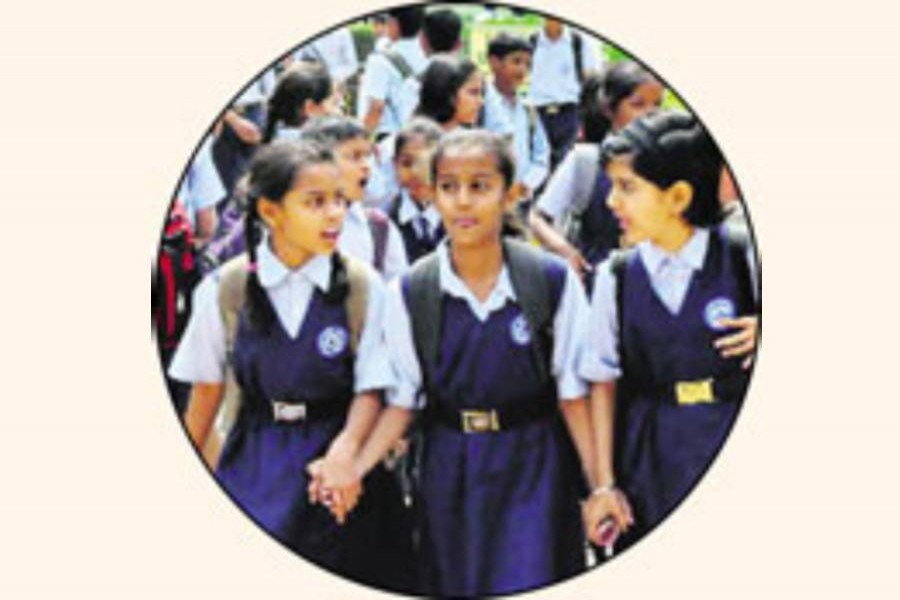If people are confused about the introduction of the new national education curriculum, they cannot be blamed. Under a pilot project it was supposed to be introduced for class I and class VI in 100 primary and secondary schools each from January 2022. The implementation of the curriculum for grade one could not go ahead as planned but it could be started for class VI in only 64 secondary educational institutions ---51 secondary schools, nine madrashas and two technical schools ---from February last.
According to the original schedule, students of class I and II of the primary level and students of grade VI and VII of the secondary level were to be brought under the new curriculum from January 2023. To go by the mass education ministry secretary's statement he made on the International Literacy Day, observed on September 8, this year, the pilot project is likely to be given a 'comprehensive start'. What is understood from this is that class I students of all primary educational institutions will receive education under the new curriculum. Similarly, class VI students may be introduced to their scheduled new curriculum.
Significantly, the curriculum for the Class I will still be considered a piloting phase. The same will happen to the curriculum of class VI because the textbooks will receive full approval in 2024 for the same class. One of the reasons for delaying the scheduled introduction was that the textbooks were still undergoing development and the teachers' teaching guides were yet to be prepared then. Now the textbooks are ready but what about the teachers' guides is not clear yet.
Then it is not also clear if class II and class VII of all the schools will have textbooks of the new curricula and start their education in the new academic year under it. If this does not happen, the overall schedule will be upset. According to the plan, class III and IV of primary schools and class VIII and IX of secondary level were supposed to adopt the new curriculum from 2024. Thus the promoted students of grades IV and IX could be inducted into the new curricula in 2025. Following the education stairs, the students of class XI and class XII would have completed the incorporation process by the years 2026 and 2027 respectively.
Now if one tier is missed, it will upset the entire process. The question is, have the textbooks compatible with the system of education envisioned been developed or if not, at what stage are they? Scarcity of newsprint and printing papers is at its worse and this is also posing a serious threat to the printing and publication of the textbooks in demand for the next academic year.
Even if this problem is overcome, the greatest of all challenges remain on the teaching front. Since there will be no examination up to grade three, classroom performance will be the sole criterion for evaluation of a learner's merit. To make education enjoyable, classroom teaching with spontaneous participation of students has to be lively. In course of such a two-way traffic, a teacher will be able to assess the potential of each individual student. This is why no provision has been left for a public examination before class X. Remarkably, students from grade VI to grade X will have to study 10 subjects with no separate streams as was the case before. The Secondary School Certificate (SSC) examinations will be held only on the basis of class X syllabus.
An overwhelming emphasis is on classroom teaching and evaluation. For example, students of grade IV and V will have to appear for exam in four subjects ---Bangla, English, Mathematics and Science and this too for 60 per cent of marks. Physical and mental health and religion will carry full marks on the assessment of classroom performance. From class VI to VIII, classroom performance will be rewarded by 60 per cent marks and students of class IX and X will have a 50:50 share in class performance and annual and public examinations respectively.
The crucial point here is evaluation of classroom performance. Are the teachers, 56 per cent of whom were found by the Campaign for Popular Education unable to prepare questions under the previous structured system popularly known as 'creative' method, ready for this far greater challenge? What is ludicrous is that the National Curriculum and Textbook Board (NCTB) has arranged five days of training for teachers. In case of such a brief training, teachers at the time of introduction of the 'creative' system failed miserably to grasp the essence of that system. This time the task demands higher skills, dedication and integrity.
In all these criteria, the majority of teachers are found wanting. The case of practical marks awarded in science and other subjects highlights the problem. Even students obtaining 25-30 marks in theoretical examinations are awarded 23-24 marks in practical examinations because the latter examinations are held under the supervision of local teachers. The subjects set aside for classroom-based assessment will become the area of bestowing generous gratis. Knowledge, skill and integrity of character for teachers and members of school managing committee will be in high demand for successful implementation of the new curricula.


